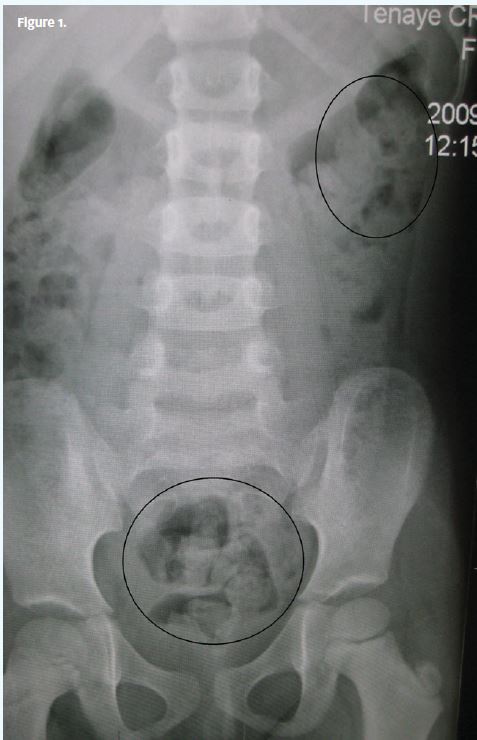A 67-year-old man presents, reporting constipation that has lasted 3 days. He has a constant, generalized dull abdominal pain that is intermittently worse, occurring in what he describes as waves. He has nausea and reports that he has vomited once. He reports no blood in the urine or stool, and no weight loss, dysuria or urinary frequency, or dizziness.
View the image taken (Figure 1) and consider what your diagnosis would be.
Differential Diagnoses
- Small bowel obstruction
- Osteolytic lesion
- Gastric malignancy
- Pulmonary infiltrate
- Calcified aortic abdominal aneurysm
Physical Examination
The patient’s medical history reveals hypertension and that he underwent an appendectomy and tonsillectomy in the past. The patient is a nonsmoker and customarily drinks 2 glasses of wine per night. His temperature is 99.2°F (37.3°C), and he has a pulse rate of 104 beats/min, respirations of 16 breaths/min, a blood pressure of 112/78 mm Hg, and an oxygen saturation of 98%. He is alert and oriented, is in no acute distress, and is breathing normally.
The patient’s lungs are clear to auscultation bilaterally. He has a regular heart rate and rhythm without murmur, rub, gallop. He has a well-healed midline abdominal scar, and his abdomen is not distended. He does have mild generalized abdominal discomfort with palpation, but there is no rigidity, rebound, or guarding.
Medical History
In patients with apparent constipation, inquire about the initial episode versus chronic constipation, frequency of stools, stool consistency, any need to strain, and pain with defecation. Patients with intermittent constipation and diarrhea may have irritable bowel syndrome. If there is pain associated with the complaint of constipation, ask about the location of pain, its onset (acute vs. gradual), its character (constant vs. intermittent), and any medications used for the pain and whether they have been used in the past.
Concerning associated symptoms include weight loss, fever, blood in the stool or urine, and dizziness. A history of malignancy, radiotherapy, or abdominal surgeries may indicate a diagnosis of cancer or small bowel obstruction.
Testing
An acute abdominal series is performed. The urgent care provider interprets the findings as “within normal limits but full of stool.”

 20172016
20172016